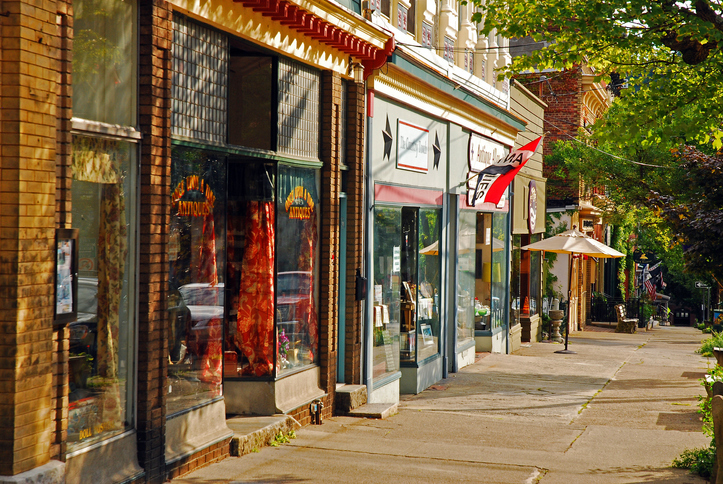COVID-19 has created an existential crisis for millions of small businesses. Between February and April alone, 3.3 million business owners shut down operations, the largest drop on record. Black and immigrant-owned businesses are three times more likely to have closed. Meanwhile, corporate giants have taken advantage of the pandemic to amass even greater wealth.
Progressives should have serious concerns about what the loss of small businesses would mean for our economy and our democracy. The devastation of the small business sector would clear a path for large corporations, Wall Street, and private equity firms to claim an even greater share of resources and political power — in both urban and rural communities.
But this crisis could also serve as an opportunity to engage small businesses in the task of rebuilding a progressive, sustainable, and equitable economy. Main Street Alliance and our allies have been working for months to elevate the voices of small business owners impacted by the pandemic as well as the ongoing assaults on our communities by police violence, racism, and failed economic relief packages.
We’re currently focused on building out in rural communities, where small businesses are the lifeblood of the local economy. Small business owners — whose opinions carry significant weight among an electorate with a disproportionate share of democratic power — will play a powerful role in the upcoming elections. But the real potential of this moment is to create a lasting alignment between small business owners and working people and, along with it, a movement capable of winning the political and economic change we need.
Small Business and Big Business Are Not the Same
Small business owners are a large and diverse group who employ over 60 million people — 47 percent of the U.S. private sector workforce. Most, including the vast majority of Black, Latinx, and Asian business owners, operate very small businesses. With median income of $51,419 for an incorporated business and $25,240 for an unincorporated one, these micro-businesses and sole proprietors have no cushion. They are also often at a disadvantage when it comes to accessing public programs that would help their businesses really thrive.
While it is true that not all small business owners are progressive, you may be surprised to learn that almost four in five business owners support public systems for health care; a strong majority favor social insurance for paid family and medical leave; two-thirds want more vigorous antitrust enforcement; and 85 percent want to see changes requiring big corporations and the wealthy to pay their fair share of taxes. For many of these business owners, such policies are pragmatic, affordable solutions that would help them run their businesses more effectively and compete on a more even playing field with big corporations.
But for decades, wealthy anti-government activists and large corporations have engaged in a kind of political identity theft against the country’s small businesses. They’ve invested heavily in long-term strategies designed to persuade lawmakers and much of the public that all businesses, both large and small, share common interests in a so-called “business-friendly agenda” focused on cutting taxes, gutting regulations and worker rights, and privatizing the economy. The notion that all businesses, big and small, share the same interests isn’t just wrong; it is a powerful, pervasive myth that impedes rational public discourse about the types of rules we should set for our economy.
Portraying all business interests as aligned helps big businesses deal with their image problem because the public generally loves small business and hates big corporations. It’s one of the discursive tricks that prevents serious public discussion about how we can and should use public policy to incentivize high road business practices and penalize extractive and exploitative business practices. In recent decades, both parties have relied on this false alignment to justify support for regulatory, trade, social welfare, and tax policies that favor giant corporations and reduce economic opportunity for working people and small businesses, in both urban and rural areas.
Yet all too often, progressives fall into the frame pitting all businesses against workers. This neoliberal framing does not help us win. On the contrary, it usually results in policies that favor big businesses at the expense of small businesses — and leave workers and families out in the cold.
Building an Economy That Works for Everyone
The economic crisis tipped off by COVID-19 has shown the deep fractures in our social safety net, while highlighting the connections between the needs of small business owners and working people. There is a tremendous opportunity in this wreckage to rebuild an economy that works for everyone.
Doing so will take significant investment in deep canvassing and organizing methods that bring high-road small businesses to the table at every juncture. We can win when small businesses are organized effectively within our movement. We know this from recent victories like the paid sick days ordinance in Duluth, Minnesota, and statewide, paid family and medical leave social insurance program in Oregon. In both cases, small business owners joined progressive, multiracial coalitions in calling for these policies as a benefit to both working families and local small businesses. Currently, Main Street Alliance is organizing small business owners in Wisconsin to participate in high-profile engagements on key election issues, including economic recovery, paid leave, health care, and child care. Through a series of candidate forums in rural state assembly and senate districts, small business owners are setting the tone for policy debates heading into the 2021 legislative session.
Progressives need to start thinking of small business owners as more than validators of our campaigns and engage them as strategic partners. We need to invest real money in outreach, education, leadership development, and organizing strategies aimed at small business owners — and develop a deep understanding of their needs and interests.
Small business owners’ needs certainly include progressive priorities: universal healthcare, Social Security and retirement security, higher corporate tax rates, universal high-road labor standards like paid family and medical leave, affordable housing, and fair market regulation. But they also include access to fair, high-quality credit and capital, commercial rent, and regulations that don’t require businesses to afford compliance attorneys. These issues must become part of the progressive agenda.
Incorporating a true small business agenda into the progressive movement is a matter of racial justice and equity. Lack of access to affordable, non-predatory credit and capital is a barrier that keeps Black and brown communities in poverty. Black-owned businesses are too often denied the capital necessary to get off the ground and, when they do succeed, tend to be smaller and less profitable. These challenges demand an effective policy response. Yet the country’s smallest independent businesses are also the ones most overlooked and disadvantaged in policy development.
The federal COVID-19 small business relief response is an instructive example of federal policies that fail to meet the needs of very small businesses and, in the process, compound structural racism in small business ownership. The Paycheck Protection Program (PPP), for example, funneled $855 million to publicly traded companies, boosted firms with access to bank “concierge treatment,” and benefited Trump donors (and, potentially, conservative groups ostensibly opposed to government intervention in the economy). Meanwhile, small, cash-strapped firms hit roadblock after roadblock. By refusing to create a universal, fully-funded program, Congress set up unnecessary competition that ordinary small businesses couldn’t win.
None of this was accidental. The provisions allowing large chains to cash in resulted from well-funded industry lobbying. And, by relying on banks — with their history of redlining and shedding of small business lending — the program stacked the deck against the majority of small business owners, particularly businesses that are Black-, Latinx-, and/or women-owned.
In a survey conducted by Color of Change and UnidosUS, only 12 percent of Black and Latinx business owners reported receiving the full federal aid they had sought; 41 percent received no aid at all after applying. We saw this happen at a rapid pace across our network. Many micro and minority-owned businesses were at a disadvantage because they did not have strong banking relationships with 7(a) lending institutions. These policy failures have meant that the pandemic is destroying capital accumulation, as well as lives, in communities of color.
Where do we go from here?
With the pandemic still raging and the worst economic damage yet to come, the stakes are urgent and immediate. To help stem the crisis and set a course for a just recovery, we need to develop a powerful, multi-racial, small business constituency that can serve as a bulwark against concentrated corporate power and income inequality. That will take a sustained investment in policy development, advocacy, and base-building, informed by the lived experiences of racially diverse, progressive, and high-road small business owners and entrepreneurs. We then must grapple with major structural policy questions that challenge conventional thinking and longstanding ideas about what is “good for business.” This includes exploring, through a racial and gender justice lens, a set of fundamental questions about the role of government, competition, markets, and ownership that starts with solutions for the most marginalized business owners and communities.
The steps in this process will be familiar to progessive organizers. Going store to store, we talk with business owners about their values, challenges, and needs. We provide a range of options for members to be engaged, from signing a petition to sharing their stories in an op-ed to speaking with policymakers. We create spaces for high-road small business owners to build a shared identity and agenda that includes progressive policies.
Progressives are right not to buy into myths about entrepreneurship designed to obscure deep structural inequalities and boost corporate power. No one knows the damaging effects of this myth better than small business owners who are struggling to stay afloat. Progressives who are serious about countering corporate concentration and advancing racial and gender justice should embrace these business owners as partners in the fight for a more just economy.
Read the entire issue on Organizing in Rural America.


